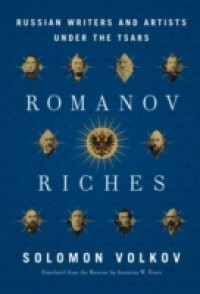In a sweeping cultural history of Russia from the rise of the house of Romanov in 1613 to its downfall at the hands of the Bolsheviks in 1917, Solomon Volkov effortlessly unwinds the twisted relationship between art and the royal family. Throughout the Romanov dynasty, Russias greatest artists and thinkers, painters and poets, composers and dancers, served two masters. Devotion to craftor principlecould never wholly eclipse dependence on the tsars. Similarly, consumers of Russian culture could never respond without political consideration: Volkov recounts how, at the 1836 premiere of Glinkas opera A Life for the Tsar, fashionable audiences watched Nicholas I in his private box to see how they ought to react. He wept, and they wept accordingly. In this spellbinding story, we watch the great figures of Russian history clash. Alexei, father of Peter the Great, befriended the writer Avvakum only to banish him; the next tsar, Fedor, had Avvakum burned alive. Using her notorious charms, Catherine the Great masterfully wielded political control over her culture industry. For his part, Pushkin became the first favored artist to resist the tsars influence. His poem To Liberty is cherished as a revolutionary work of dissent. But even Pushkins genius went unspared: Alexander tired of the poets literary and amorous freethinking and banished him from St. Petersburg. Romanov Riches is a work of epic scale that never sacrifices individual characters for broader themes. Gogol, Dostoevsky, and Tolstoy are presented in a devilishly intricate dance with their royal patrons. A truly essential work for anyone who wants to understand Russias passionate devotion to its most important artists, it is the prequel to Volkovs acclaimed work The Magical Chorus: A History of Russian Culture from Tolstoy to Solzhenitsyn.From the Hardcover edition.

